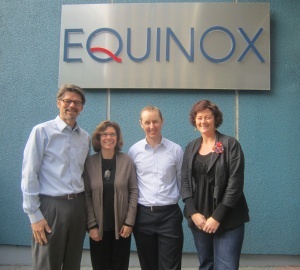Share this
Business analysis interview with Rich and Elizabeth Larson of Watermark Learning
by Brendon Livingstone on 10 July 2012
 A couple of weeks ago Equinox hosted Richard and Elizabeth Larson of US-based Watermark Learning in New Zealand to deliver training and presentations on business analysis and influencing skills. Richard and Elizabeth are the authors of the popular CBAP Certification Study Guide. During their visit I was lucky to spend a good amount of time with them, and took the opportunity to interview them about their thoughts on business analysis and the BA career.
A couple of weeks ago Equinox hosted Richard and Elizabeth Larson of US-based Watermark Learning in New Zealand to deliver training and presentations on business analysis and influencing skills. Richard and Elizabeth are the authors of the popular CBAP Certification Study Guide. During their visit I was lucky to spend a good amount of time with them, and took the opportunity to interview them about their thoughts on business analysis and the BA career.
Brendon: If you were starting your careers again, what would you do?
Elizabeth: I'd become a doctor. I'm interested in the medical field and I am much less squeamish than I used to be. But the idea of solving problems and doing the analysis just appeals to me and it uses a lot of the skills that I already have. Business analysis skills, taking in a lot of information, synthesising it, and coming up with the underlying problem appeals to me. Aside from that, I love what I do, and although what I have been through has been painful sometimes, I had to go through that pain in order be doing what I do now.
Rich: You can add to Elizabeth's list therapist or psychiatrist. For me the quick answer is I can't imagine doing anything different. When I was younger my parents really thought I should become a lawyer - they were urging me like crazy and I think I rebelled against that. I much prefer the colleagues that I interact with in this field. Training has helped me use a lot of my skill sets and I think I am a natural business analyst. I've tried lots of things including programming and project management. A lot of those things did not appeal to me as much as this field - it just feels right. I don't know any kids who grow up wanting to become a business analyst; nobody grows up wanting to be a trainer either.
Brendon: What sets the best BAs apart from average BAs?
Elizabeth: The best BAs that I have worked with are the ones who do such a good job of creating structure from chaos. So there is a period of time when you are doing your business analysis, where it is very chaotic, there are a tonne of business issues and they somehow take all of that and synthesise a lot of information, they put structure around it and they come up with solutions.
Rich: A philosophy underlying a lot of our training is for people to operate as internal management consultants. What makes the best BAs is not just taking a solution and running with it, but respectfully questioning people. They do it in a respectful way and do what is right for their organisation. They focus on the vision and strategy and keep that in mind, keeping their head above the water and looking through the organisation - they focus on the organisation rather than just on the project.
Elizabeth: As a project manager I was very impatient, get it done on time and within budget, and the best BAs could explain to me and influence me in a way to take the time to get the requirements right. Having the patience, the fortitude, the ability to influence to get it right for the business. To be able to influence not just the business stakeholders but also the project manager. I came to rely on that a lot and would have made poor decisions many times as a project manager without it.
Brendon: What is the best way to learn the skills that make the best BAs?
Rich: The skills that make the best BAs are often not the technical skills but the soft skills. Often these are attributes rather than skills. We have two courses, one is called 'Consulting Skills to Solve Business Problems' and the other 'Influencing without Authority'. We also run elicitation and facilitation training. By developing these soft skills it builds confidence. We like to say it takes courage to be influential because you know what the organisation needs to do, you can build up trust, and recommend the right thing. Let's say an executive VP is in your requirements session and causing trouble and trying to force their requirements down a certain path, the best BA would have the courage to be able to stand up and enforce the ground rules, while always being respectful at the same time.
Elizabeth: In addition to training courses, when you are new to the field you are going to make a lot of mistakes. I don't know any other way to get some of these skills other than having been through it.
Brendon: How important is it to have consistent frameworks, templates, ways of working and tools to the success of business analysis teams?
Elizabeth: I think it's huge, because no matter what we do we have different mental models when we hear something. Even a term like 'work breakdown structure', that could mean 10 different things to 10 different people, their mental models would be different. To all have the same understanding relating to some of the terminology used in business analysis, I just think it (frameworks, templates, and tools) makes it easier for everyone - the teams and the business stakeholders.
Rich: The framework is huge, having that as a common vocabulary. I think templates guide people, as long as you're not a template zombie and feel like you've got to fill out every last bit of it, they are good on the job aids and touch points to remind yourself of what are the important areas to do. They are especially useful if you are a generalist business analyst. If you do nothing but data modelling then you hardly need a template to do an ERD or data dictionary. But if you only do that once every few months or years and then you don't touch a data model again because your projects don't need it, then templates are indispensable.
Elizabeth: I think having a flexible structure is really important, because the one size fits all heavy duty requirements document for every single project does not work. And I have come full circle on that because there was a time when I thought that was a great thing.
Brendon: What is your recommended approach for BA managers and team leads to establish these frameworks and templates in their teams?
Elizabeth: It is really hard if you don't have some type of centre of excellence or community of practice. It is hard to get that consistency. If there is nothing at the organisation level, then you come up with your own and it's not ideal.
Rich: And if you have each project team coming in with their own there is chaos. You need some common understanding across project teams. The BABOK also has a lot to offer organisations to help them manage. I've had people who told me that they view the BABOK as an on-going job reference and they keep it on their desk.

Share this
- Agile Development (153)
- Software Development (126)
- Agile (76)
- Scrum (66)
- Application Lifecycle Management (50)
- Capability Development (47)
- Business Analysis (46)
- DevOps (43)
- IT Professional (42)
- Equinox IT News (41)
- Agile Transformation (38)
- IT Consulting (38)
- Knowledge Sharing (36)
- Lean Software Development (35)
- Requirements (35)
- Strategic Planning (35)
- Solution Architecture (34)
- Digital Disruption (32)
- IT Project (31)
- International Leaders (31)
- Digital Transformation (26)
- Project Management (26)
- Cloud (25)
- Azure DevOps (23)
- Coaching (23)
- IT Governance (23)
- System Performance (23)
- Change Management (20)
- Innovation (20)
- MIT Sloan CISR (15)
- Client Briefing Events (13)
- Architecture (12)
- Working from Home (12)
- IT Services (10)
- Data Visualisation (9)
- Kanban (9)
- People (9)
- Business Architecture (8)
- Communities of Practice (8)
- Continuous Integration (7)
- Business Case (4)
- Enterprise Analysis (4)
- Angular UIs (3)
- Business Rules (3)
- Java Development (3)
- Lean Startup (3)
- Satir Change Model (3)
- API (2)
- Automation (2)
- GitHub (2)
- Scaling (2)
- Toggles (2)
- .Net Core (1)
- Diversity (1)
- Security (1)
- Testing (1)
- February 2024 (3)
- January 2024 (1)
- September 2023 (2)
- July 2023 (3)
- August 2022 (4)
- August 2021 (1)
- July 2021 (1)
- June 2021 (1)
- May 2021 (1)
- March 2021 (1)
- February 2021 (2)
- November 2020 (2)
- September 2020 (1)
- July 2020 (1)
- June 2020 (3)
- May 2020 (3)
- April 2020 (2)
- March 2020 (8)
- February 2020 (1)
- November 2019 (1)
- August 2019 (1)
- July 2019 (2)
- June 2019 (2)
- April 2019 (3)
- March 2019 (2)
- February 2019 (1)
- December 2018 (3)
- November 2018 (3)
- October 2018 (3)
- September 2018 (1)
- August 2018 (4)
- July 2018 (5)
- June 2018 (1)
- May 2018 (1)
- April 2018 (5)
- March 2018 (3)
- February 2018 (2)
- January 2018 (2)
- December 2017 (2)
- November 2017 (3)
- October 2017 (4)
- September 2017 (5)
- August 2017 (3)
- July 2017 (3)
- June 2017 (1)
- May 2017 (1)
- March 2017 (1)
- February 2017 (3)
- January 2017 (1)
- November 2016 (1)
- October 2016 (6)
- September 2016 (1)
- August 2016 (5)
- July 2016 (3)
- June 2016 (4)
- May 2016 (7)
- April 2016 (13)
- March 2016 (8)
- February 2016 (8)
- January 2016 (7)
- December 2015 (9)
- November 2015 (12)
- October 2015 (4)
- September 2015 (2)
- August 2015 (3)
- July 2015 (8)
- June 2015 (7)
- April 2015 (2)
- March 2015 (3)
- February 2015 (2)
- December 2014 (4)
- September 2014 (2)
- July 2014 (1)
- June 2014 (2)
- May 2014 (9)
- April 2014 (1)
- March 2014 (2)
- February 2014 (2)
- December 2013 (1)
- November 2013 (2)
- October 2013 (3)
- September 2013 (2)
- August 2013 (6)
- July 2013 (2)
- June 2013 (1)
- May 2013 (4)
- April 2013 (5)
- March 2013 (2)
- February 2013 (2)
- January 2013 (2)
- December 2012 (1)
- November 2012 (1)
- October 2012 (2)
- September 2012 (3)
- August 2012 (3)
- July 2012 (3)
- June 2012 (1)
- May 2012 (1)
- April 2012 (1)
- February 2012 (1)
- December 2011 (4)
- November 2011 (2)
- October 2011 (2)
- September 2011 (4)
- August 2011 (2)
- July 2011 (3)
- June 2011 (4)
- May 2011 (2)
- April 2011 (2)
- March 2011 (3)
- February 2011 (1)
- January 2011 (4)
- December 2010 (2)
- November 2010 (3)
- October 2010 (1)
- September 2010 (1)
- May 2010 (1)
- February 2010 (1)
- July 2009 (1)
- April 2009 (1)
- October 2008 (1)
